Publications
Explore our publications by our team of experts within the DDP network. Our publications advance knowledge and contribute to deep decarbonization from the perspectives of our in-country experts.
- DDP-Initiative
- Synthesis
- 2026
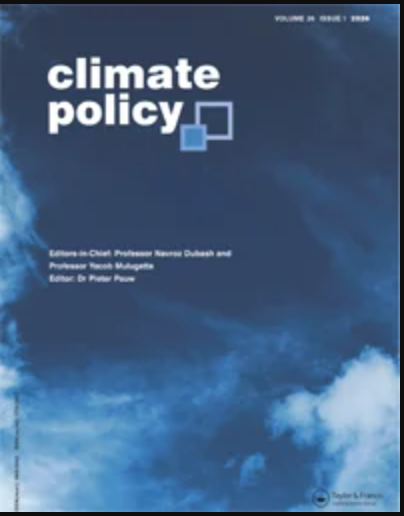
Net-zero compatible development pathways in Argentina, Brazil, China, India, Indonesia, Mexico and South Africa: lessons for short-term actions
Applying the DDP approach to seven large emerging economies, the study shows that while pathways differ according to national circumstances and socio-economic priorities, they share common transformations: reduced final energy demand, a steady phase-down of fossil fuels in favor of low-GHG energy sources, and enhanced carbon absorption through land use. To enable these transitions, the paper highlights three policy priorities: strengthening existing low-carbon solutions in key sectors (power, transport, land use), addressing structural inertias and avoiding carbon lock-ins through long-term planning, and integrating social and economic measures to manage the transition’s impacts and ensure it is both equitable and sustainable. This synthesis is an analysis based on the results of the Insights from Modelling and Analysis for Global Interactions and National Engagement (IMAGINE) project funded by the European Commission.
- Yann Briand, Johannes Svensson, Clara Lepin, Henri Waisman, Christopher Bataille, Lukytawati Anggraeni, Vidhee Avashia, Aliosha Nicolás Behnisch, Rizaldi Boer, Daniel Buira, Savahna De Kock, Retno Gumilang Dewi, Carolina Burle Dubeux, Amit Garg, Thalia Hernandez, Francisco Lallana, Emilio Lèbre La Rovere, Bryce McCall, Marina Recalde, Ucok W.R. Siagian, Saritha Sudharmma Vishwanathan, Julia Tatham, Fei Teng, Jordi Tovilla & William Wills
- DDP-Initiative
- Report
- 2025
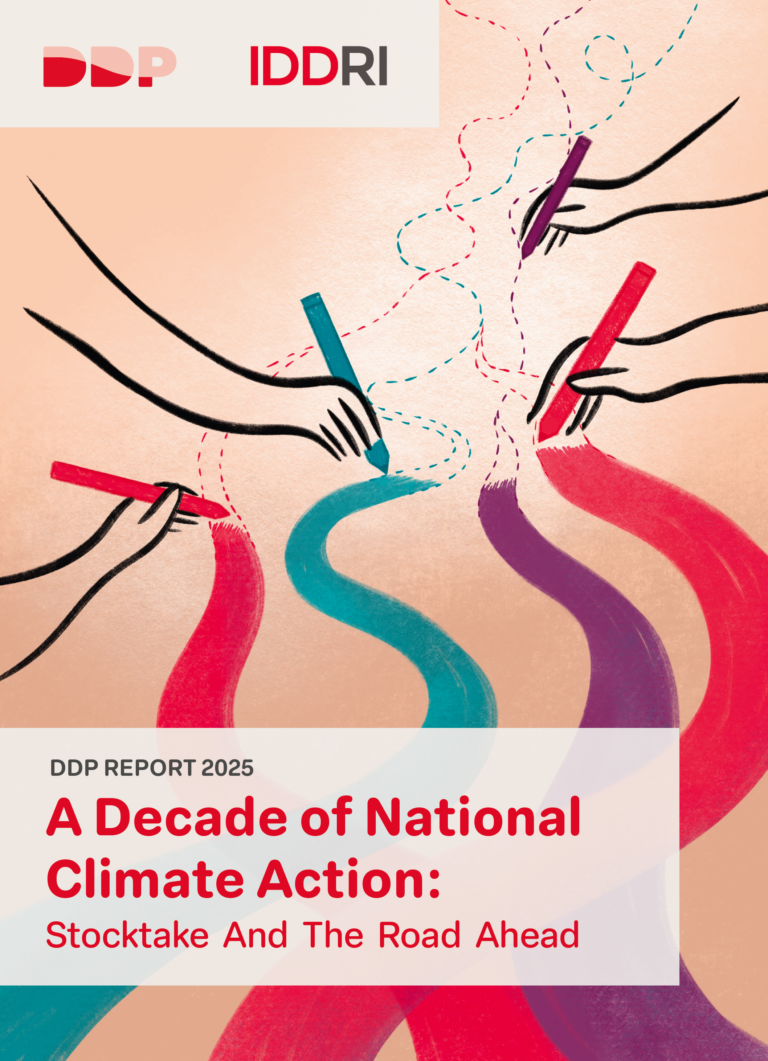
A Decade of National Climate Action: Stocktake And The Road Ahead
Ten years on from the Paris Agreement the report “A Decade of National Climate Action: Stocktake and the Road Ahead” analyzes what has been the real effect of the Paris Agreement on climate action.
Complementarily to globalheadlines, the report is grounded on a detailed analysis of climate action at the national level from DDP experts across 21 countries, representing a diversity of geographies, levels of development, and sizes (Argentina, Brazil, Canada, China, Costa Rica, Côte d’Ivoire, Dominican Republic, France, EU, Germany, Guatemala, India, Indonesia, Japan, Kazakhstan, Mexico, Nigeria, Senegal, South Africa, Thailand, United States).
- DDP Initiative
- NDC-Aspects
- Brief
- 2024
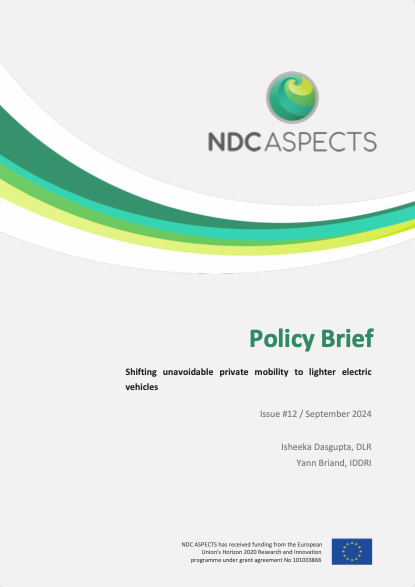
- Germany, USA
Shifting unavoidable private mobility to lighter electric vehicles
A new Policy Brief by Isheeka Dasgupta (DLR) and Yann Briand (IDDRI) proposes that, after having shifted all possible private motorized mobility towards public transportation, going lighter and smaller is one of our best bets to satisfy mobility needs.
- Isheeka Dasgupta, DLR Yann Briand, IDDRI
- NDC-Aspects
- Brief
- 2024
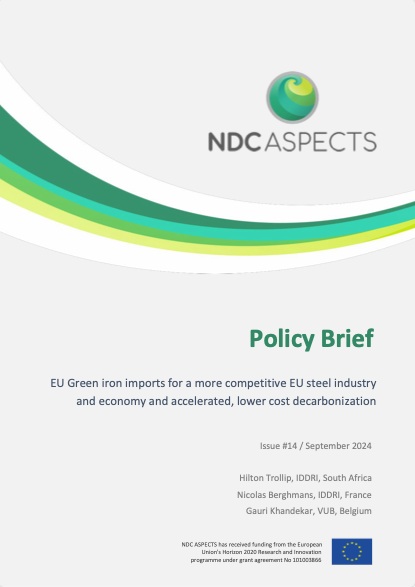
- Europe
EU green iron imports for a more competitive steel industry and accelerated decarbonisation
A new Policy Brief by Hilton Trollip (IDDRI), Nicolas Berghmans (IDDRI), and Gauri Khandekar (VUB) suggests that green iron imports rooted in comparative advantages of different geographies are technically achievable and economically sound.
- Hilton Trollip (IDDRI), Nicolas Berghmans (IDDRI), and Gauri Khandekar (VUB)
- NDC-Aspects

- Chile, Europe, India
NDC – LT-LEDS alignment guide: Aligning short-term plans with long-term ambitions
This guide was developed through close collaboration between the 2050 Pathways Platform and the Deep Decarbonization Pathways Initiative (DDP) at IDDRI. In order to help countries achieve alignment of short-term plans with the long-term systemic transformations needed to meet the goals of the Paris Climate Agreement, it provides a practical framework based on the premise that countries can fully understand how their NDCs align with the Paris Agreement only by viewing alignment through the lens of a Long-Term Low Emission Development Strategy (LT-LEDS), which can highlight transformations and actions that might be overlooked in a short-term perspective, expanding the scope of the alignment process. It also also includes four country case studies (Chile, European Union, Morocco, India) presenting real examples of alignment.
- Pérez Català, A., Waisman, H.
- DDP-Initiative
- Report
- 2024
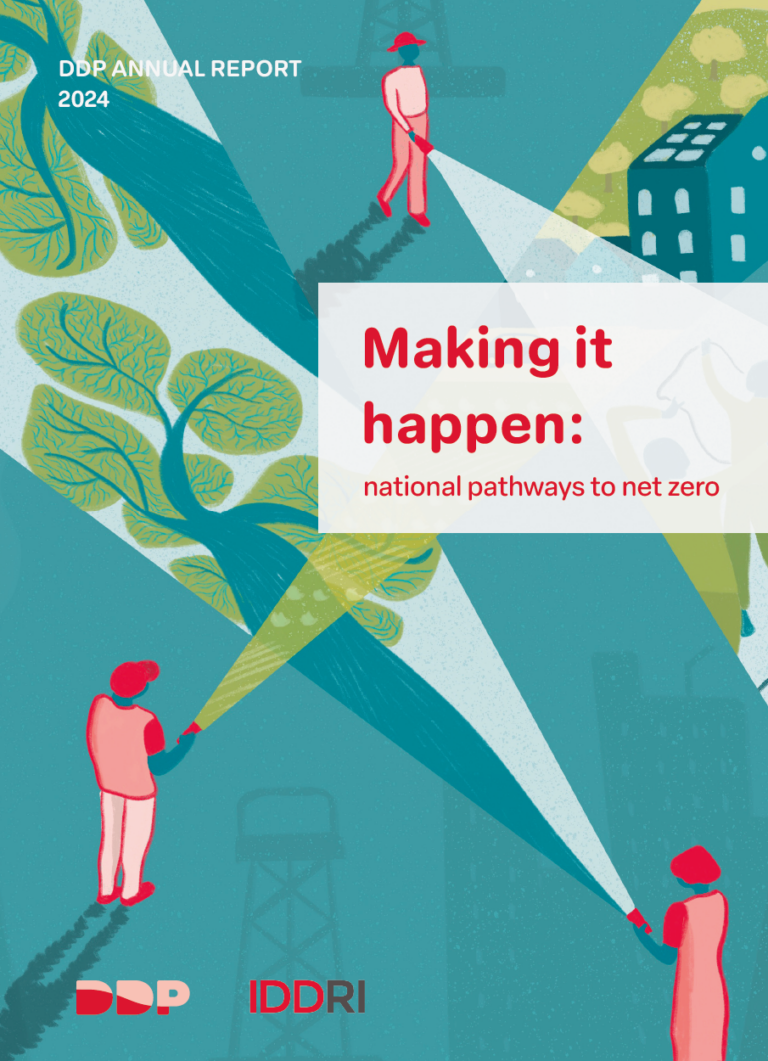
Making it happen: national pathways to net zero
This 2024 report analyzes detailed scenarios from ten countries collectively representing nearly half of the world’s population and a significant portion of global emissions: Argentina, Brazil, China, India, Indonesia, Mexico, Nigeria, Senegal, South Africa, and the United States, based on in-country perspectives from local experts.
The report’s deep decarbonization scenarios showcase a variety of pathways to achieve carbon neutrality while maintaining economic growth and improving social well-being
- DDP
- DDP-Initiative
- Article
- 2024
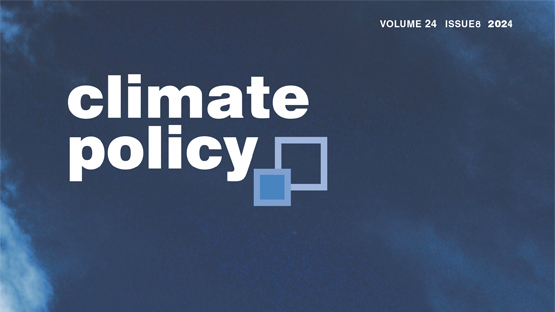
- Brazil, India, Indonesia
The AFOLU sector’s role in national decarbonization: a comparative analysis of low-GHG development pathways in Brazil, India and Indonesia
This paper analyses the role that AFOLU (agriculture, forest and other land use) plays in national deep decarbonization scenarios in Brazil, India and Indonesia between 2020 and 2050. It finds that the LULUCF (land use, land use change and forestry) subsector is important for medium-term mitigation (2020–2030) while continuing to contribute to mitigation over the long-term (2030–2050) in the three countries. Mitigation actions in LULUCF include drastically reducing deforestation (Brazil, Indonesia) and peat degradation (Indonesia), re-/afforestation (all), increased sequestration in standing forests (Brazil, Indonesia) and increasing soil carbon in agricultural lands (India).
- Johannes Svensson
- DDP-Initiative
- Report
- 2024
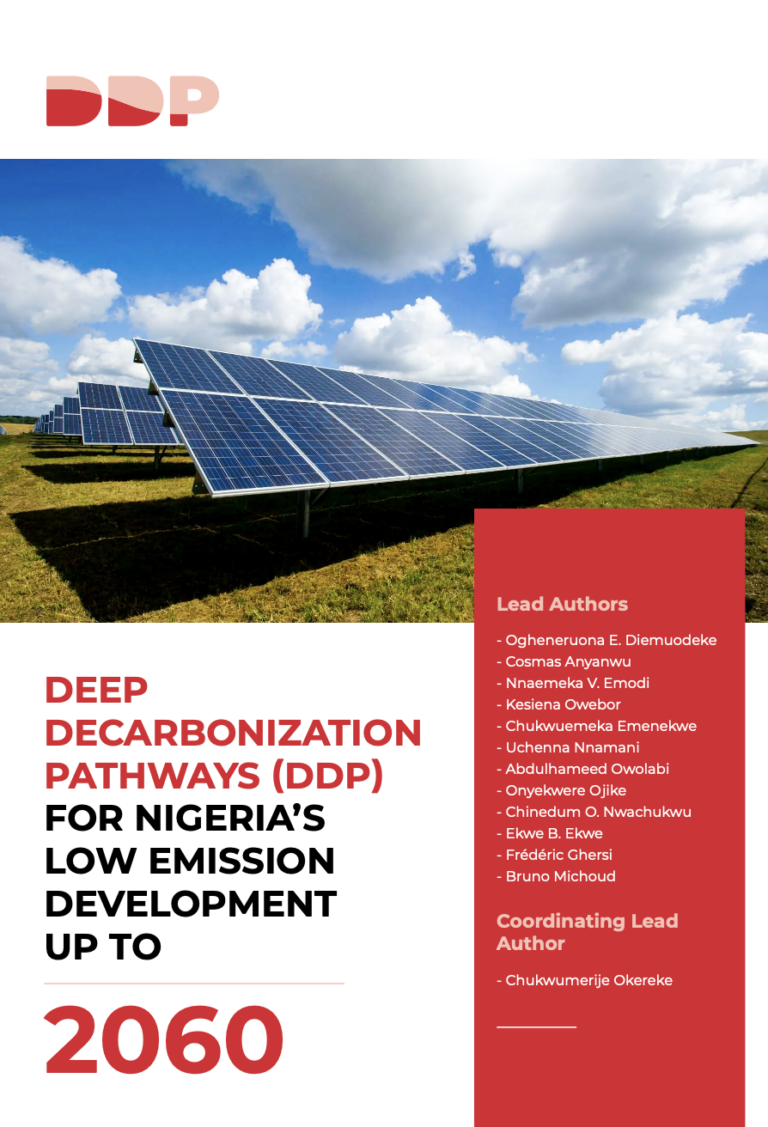
- Nigeria
Deep Decarbonization Pathways (DDP) for Nigeria’s Low Emission Development up to 2060
This report summarises the results of the Deep Decarbonisation Pathways Project in Nigeria. The DDP-Nigeria project is a national research and capacity-building project for the implementation of a Deep Decarbonisation Pathway (DDP) in Nigeria under the framework of the 2050 Facility funded by the Agence Française de Dévelopment (AFD) with the International Relation and Sustainable Development Institute (IDDRI) as the Programme Coordinator with contributions from the Centre International de Recherche sur l’Environnement et le Développement (CIRED) France. The project was done in collaboration with the Federal Ministry of Environment, Nigeria, through the Department of Climate Change (DCC) and the National Council on Climate Change (NCCC).
- Chukwumerije Okereke
- JETP
- Brief
- 2023
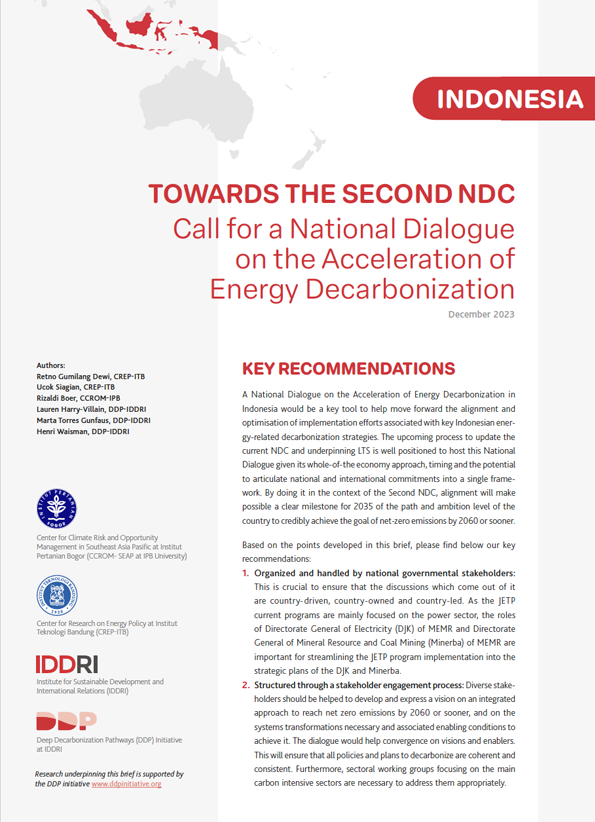
- Indonesia
Towards the Second NDC : Call for a National Dialogue on the Acceleration of Energy Decarbonization in Indonesia
Indonesia has a climate goal to reach net-zero emissions by 2060 or sooner. Recent initiatives like the JETP, which focuses on decarbonizing the on-grid power sector with USD20 billion in public and private financing, have brought light on the importance of the alignment of key Indonesian energy-related decarbonization strategies such as LTS-LCCR, NDCs and other plans, for effective implementation and funding. Indeed, lack of coherence creates the risk of not reaching emission reduction goals. A National Dialogue on the Acceleration of Energy Decarbonization in Indonesia would be a key tool to help move forward the alignment and optimisation of implementation efforts. By doing it in the context of the Second NDC, alignment will make possible a clear milestone for 2035 of the path and ambition level of the country to credibly achieve the goal of net-zero emissions by 2060 or sooner.
- DDP Initiative